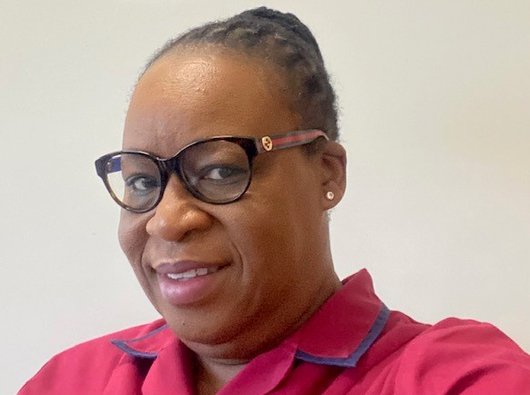Supporting people with blood cancer to make decisions around clinical trials
Millie, an Advanced Nurse Practitioner, tell us about her important role in helping people with blood cancer to make decisions around clinical trials. Here, she explains some of the barriers she faces, and how she overcomes them.
Millie, an Advanced Nurse Practitioner.
Millie is an Advanced Nurse Practitioner in the haemato-oncology department at North Middlesex University Hospital.

I look after people who have blood cancers. My main focus is myeloma, myelodysplastic syndromes and myeloproliferative neoplasms.
My role in clinical trials has been to help select people to take part based on the trial inclusive and exclusive criteria. I explain what’s involved in the trial and introduce them to the trial nurse, who takes it from there.
Fear of being a ‘guinea pig’
From my experience over the years, I’ve found that people worry that they’re being used as a guinea pig, and that the safety of a drug is being tested on them.
I explain that there are strict regulations in place to make sure that the drug is safe before it reaches the clinical trial.
Trial drugs are standard treatments that have already been approved to treat different conditions. The clinical trial may be looking at how effective each drug is in treating a blood cancer in comparison with other blood cancer treatments.
Personalised care and monitoring
The word ‘trial’ itself can also put people off. It can be related to testing. We should try to use softer language when talking to people about their options, highlighting the benefits of being involved.
One of the big positives of being part of a trial is that you’re monitored very closely. The care you receive is personalised in every way. You’ll receive extra support from the Clinical Trial Nurse, and the effectiveness of the treatment is checked more often than with standard treatments.
It’s also important for people to know that they can leave the trial at any point.
Barriers and beliefs
A lot of people won’t take part in trials because English isn’t their first language. There are several different dialects in my area of North London and, especially since Covid, face-to-face interpreters have been difficult to organise. But the interpreting services, Language Line and thebigword, are able to offer help.
People in some communities tend to want to go for herbal treatments, which is information or traditions that have been passed from generation to generation. Some people may prefer ‘natural’ treatments and are worried about chemicals, so may not be willing to undergo chemotherapy, for example. I encourage them to take their time and think of the benefits against the risks.
Building trust
As well as the lack of understanding of what a clinical trial is and safety concerns, some people feel they’re not being told the truth about the trial, and that there’s a ‘hidden agenda’.
Peers and family may have told them stories about trials that went wrong in the past. The Tuskegee trial involving African-American men is an example of when researchers weren’t open and honest. One or two people have mentioned this to me.
My role is to explain that getting involved in a trial is totally their choice and help them find more information to make a decision.
It can be helpful for them to talk to a ‘buddy,’ someone from the same ethnic background who has gone through a trial.
Weighing up the options
Before deciding to take part in a clinical trial for blood cancer, there are some important questions for people to ask. What are the aims of the trial? What are their options if they don’t go ahead? What are the benefits of taking part and how will they be supported? What are the possible side effects? How long is the trial?
There’s a lot of uncertainty, so support from a Blood Cancer UK Clinical Trials Support Nurse could be a great help. The standard of the information Blood Cancer UK offers is excellent, and talking things through with another expert who understands the issues could be reassuring.
The important thing is for people to take their time and ask all the questions they want.

Contact our Clinical Trials Support Service
Get personalised support to understand which clinical trials are available - whether you're a patient, carer or healthcare professional.

